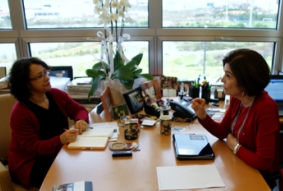Wednesday talks with Nesrin Balkan
Nakiye Boyacıgiller: From the outside, you may think Nakiye has had it all roses, but I did have bitter periods in my life. And that’s what life is; you embrace it for better or for worse. A happy childhood is the silver spoon in your mouth. It is your most important asset that you spend throughout your life.
Born in the USA to Turkey’s first petroleum engineer, Oğuz Avdan. We know her by her smiling face, swathes of colors she chooses to wear from red to purple and fuchsia and green, not to mention her wild dance figures at New Year's parties. The inaugural guest of “Wednesday Talks” is Nakiye Boyacıgiller. Today, we take a look into her personal life; her childhood, devastating losses, first love, and her outlook on life. In the next chapter, we will talk about her career after she came to Turkey to work at Sabancı University, and the international recognition enjoyed by the faculty under her leadership.
I have known you for ten years, and your colorful personality shines through the way you dress. I must admit I sometimes envy you and your choice of dress. How much of this color rubs off on your surroundings; how are you with being a dean, having a family, pursuing administrative and academic work?
Excellent question Nesrin; let me put it to you this way: I love life, I love people, and I love to smile. I believe this had a great effect on my personal life and career. Whenever they ask me about somebody, I always say “He’s a great person.” And they tell me I say that for everyone. I almost always look on the full side of the glass and the better side of people. And I always try to look on the bright side of life, which yields returns. Yes, I do dress in colors; I love neutral colors on other people but they simply don't work for me. I am borderline hyperactive and unable to sit still–that is the legacy of my late father. As an upside, I work very hard. I always try to do more, and I think this did good for the faculty. I have never contented myself with the work I did. I always think about what more can be done.
Can you talk about your childhood, your family, relations to your parents…
I was born in America. My father Oğuz Avdan was Turkey’s first petroleum engineer. He goes to America in 1937 with a Mining Survey Authority fellowship, and upon return he has compulsory service, where he works at a refinery in the town of Batman. He marries my mother and they lose their first child at birth because of blood sensitivity. When my mother was pregnant with me, my father receives a job offer from a petroleum engineering company in America, which he accepts because they fear blood sensitivity will be an issue for their second child as well. So they move to America before I was born. I was born in 1953 and was immediately taken into an incubator, and I had a complete blood transfusion just like my late brother had. The procedure had just been discovered; I think it was in 1952. That’s why I always say I’m one year younger than the technology needed to keep me alive. I had a very happy childhood in America for 11 years, and then we moved to France for my father’s job, and during the two years we lived there, we lost my mother in a terrible car accident. And that’s why I always tell people to wear seat belts. I first came to Turkey when I was 13. My Turkish then was limited to “table talks” – the conversations you have in the kitchen and such, and children’s books. I joined the Üsküdar American Academy in the 9th grade. I had a very difficult time in high school, from 1967 onwards. I had just lost my dear mother, I spoke little Turkish, the school was too difficult, I needed to adapt culturally. But my grandmother and aunt fully embraced me, and that is how my personality came to suit the Turkish way of life, family affairs and all that. Boğaziçi University, then Robert College, had a separate admission exam. If the central admission system was in place, I would never have made it there. But back then, they had a separate admission process; they wanted recommendations and checked your high school grades. I’ll never forget how, when I got a 6 in the first Turkish essay that I wrote, my teacher Perizat Hanım told the class “Turn the 6 upside down and that’s 9 for Nakiye.” She wrote me a recommendation explaining why my grades were low, and I was admitted to Robert College, which became Boğaziçi University during my time there. I was an honor student too: I graduated in third place.

This interview is taken from "Wednesday talks with Nesrin Balkan" column of GazeteSU.








